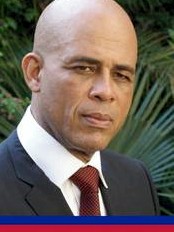
BY JACQUELINE CHARLES
JCHARLES@MIAMIHERALD.COM
PORT AU-PRINCE -- A controversial carnival singer who reinvented himself as a polished political outsider is poised to become Haiti’s next president, according to preliminary election results announced Monday.
Michel “Sweet Micky’’ Martelly garnered 67 percent of the vote to 31 percent for longtime opposition leader and former first lady Mirlande Manigat, the Provisional Electoral Council said.
The announcement was greeted with fireworks as fans spontaneously paraded in the streets carrying Martelly’s pink posters and beeping car horns.
Supporters ran in front of elections headquarters singing, “Martelly, the country is for you. Do what you like with it.’’
Others sang “Tet Kale,” the bald-headed one, Martelly’s moniker during the campaign.
“The country is sweet, now. Change is coming,’’ said Louis Viccues, 42, who works at a dry cleaner. “Nothing is worse than to be living in a country and working, and you cannot eat.’’
But while Martelly, 50, won with a 2-1 margin, the results will likely be challenged by Manigat, 70, before they are certified.
After The Miami Herald first reported the results Monday, Manigat’s campaign sent a letter to the justice minister accusing Electoral Council President Gaillot Dorsinvil of influencing the results during a Sunday night visit to the vote tabulation center.
Even with the challenge, Haiti’s streets remained free of the violence the international community had feared if Martelly had lost. Although there had been a perception for weeks that Martelly would be declared the winner, his campaign was unsure of the outcome even as advisors put him through governance tutorial courses and met to map out the transition.
The news of Martelly’s win was met with cheers and disbelief by Haitians here and abroad who witnessed his presidential bid, a well-financed modern campaign complete with foreign consultants and live Twitter and Internet feeds.
For some, the victory is a “rupture’’ with the last 25 years that have governed Haiti after the fall of the 29-year Duvalier family dictatorship. Others see more of the same as a political novice leads a nation struggling to dig out from the devastation of the Jan. 12, 2010, earthquake, deal with a deadly cholera epidemic and drastically improve conditions for the country’s 10 million citizens.
“While Martelly is indeed a new leader, the structure of economic power remains the same and the old problems have not disappeared. In fact, the key players of yesterday have not vanished’’ said Robert Fatton, a Haiti expert at the University of Virginia who has been following the elections since last year. “Despite his dramatic eruption, Martelly may well be a case of ‘old wine in a new bottle,’ but time will tell.’’
Still, Martelly’s ride from dark horse to the broken national palace is viewed as a vote against outgoing President René Préval, and the country’s traditional political class, both of whom have failed to provide economic and social progress over the past 25 years. The lack of progress in improving the population’s condition after the earthquake only intensified the anti-Préval and anti-status quo feeling among voters.
“Voters simply wanted someone who captured the idea of ‘change,’ and Martelly, the persona and the candidate, embodied that mood,’’ Fatton said.
But Haiti observers say the fact that most of the country’s 4.3 million voters sat out the elections cannot be discounted. Nor can the fraud that lawyers inside the vote tabulation center found over the past 14 days as they scrutinized more than 25,000 presidential tally sheets.
The preliminary results were transmitted at 8 a.m. Monday to the executive director of the Provisional Electoral Council, whose members triggered momentary panic Sunday evening when they unexpectedly showed up at the vote tabulation center where tally sheets were undergoing a final scrutiny for fraud.
The second round of elections for the presidential and legislative races was better organized than the first round. But like the chaotic Nov. 28 first round, the runoffs were also marred by fraud and irregular voting.
During the March 20 runoff, voters not only stuffed ballots but included fraudulent voter identification numbers, which were detected by election workers who included 16 attorneys trained in new criteria set up by the Organization of American States, according to sources.
Martelly “was the beneficiary of the turmoil and all of the attention that the flaw of the first round generated,’’ said Eduardo Gamarra, a political analyst on Latin American politics and adviser to Dominican President Leonel Fernandez.. “The irony is all of these reports of fraud are what pushed him into the second round.’’
With the lack of control in parliament, a boycott of the elections by several parties and the presence of former presidents including Préval, former dictator Jean-Claude “Baby Doc’’ Duvalier and now Jean-Bertrand Aristide, Martelly could find “ruling Haiti even more complicated,’’ Gamarra said.
“You have a government with probably not a very long honeymoon that is going to have credibility with other political groups there and the international community may begin to look at with some suspicions because of the origins of its mandate,’’ Gamarra said

No comments:
Post a Comment
To Post Use Name/URL (Enter a unique name)
OR
Log in with Goggle Account if you have one